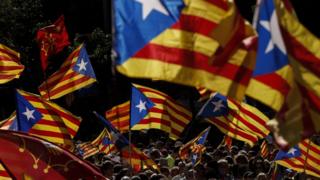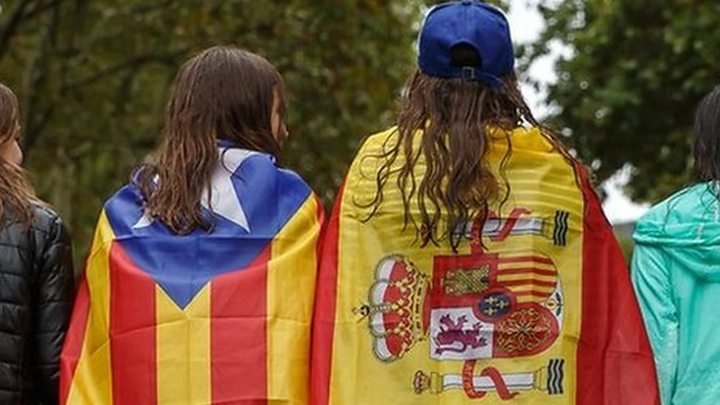Catalan ‘rebellion’ trial puts Spain’s courts to the test
Writing from his prison cell, the former vice-president of Catalonia knows he is facing a potential 25 years in prison for rebellion.
Oriol Junqueras is one of a dozen former political leaders facing trial over his region’s independence bid in October 2017. Some stand accused of a violent uprising – one they say never happened.
There are no apologies – Mr Junqueras insists on his innocence, telling the BBC that the “trial is an action against an ideology and against political dissent”.
“It’s a judgement on democracy,” he said, and one “which creates a dangerous precedent for all of Europe”.
Another defendant fears they will face a court stacked against them, with a “pre-determined outcome”.
But the Spanish government has defended the process, insisting the accused will get a fair trial – while the rest of the world watches.
Controversy in Catalonia
The 12 accused face charges including rebellion, sedition and the misuse of public funds for their part in the 2017 push for independence from Spain.
A disputed referendum – in which a majority of those who took part backed independence – was held in the territory on 1 October 2017.
A little more than three weeks later, the parliament in Barcelona voted to declare Catalonia an independent republic.
Yet the referendum saw a low turnout, and had been declared illegal by Spain’s Constitutional Court. Madrid stepped in to impose its rule on the region, and several Catalan leaders fled or were arrested.
A year and a half later, the vote is still controversial.
On Sunday, thousands took to the streets of Madrid to demonstrate their support for a united country ahead of the trial.
And Socialist Prime Minister Pedro Sánchez has come under pressure for his attempts at dialogue with the leadership in Catalonia.
Prosecutors allege the accused – who include ex-ministers, the former speaker of the regional parliament and the leaders of pro-independence organisations – acted against Spain’s constitution, which guarantees “the indissoluble unity of the Spanish nation”.
All deny the charges against them.
Mr Junqueras – the most senior member of the then Catalan government not to flee the country – said the trial was politically motivated.
The former vice-president refutes the charge of rebellion, which Spanish law defines as a “violent, public uprising” to achieve goals such as “the independence of a part of the national territory”.
“Ours has been an extremely peaceful process and so these crimes are totally non-existent in our case. The only violence has been that applied by the National Police and Civil Guard on 1 October against voters who were trying to put a paper in a ballot box,” he said.
The Catalan government said more than 900 people were injured as police tried to seize ballot boxes and close polling stations.
‘A pre-determined outcome’
In November, more than 100 legal experts from across Spain signed an open letter (in Spanish) condemning the use of the charge of rebellion in the Catalan case.
In an exclusive interview, Mr Sánchez, the former president of the Catalan National Assembly (ANC), said: “Even those who accuse us of rebellion don’t believe it. Where was the uprising? It’s a total farce.”
Mr Sánchez also accuses politicians in Madrid of trying to influence the trial.
“The judges were chosen by the political parties to control it and impose a pre-determined outcome,” he said. “Despite everything, they haven’t accepted our objections. There is nothing more to say. It will be a trial with political objectives.”
The prime minister disagrees. Speaking on a visit to Strasbourg ahead of the start of the trial, he said that in Spain “individual rights, public freedoms and the rights of minorities are guaranteed and protected”.
The trial is expected to last around three months.
A long witness list includes the Spanish prime minister at the time of the referendum, Mariano Rajoy.
Who are the imprisoned independence leaders?
There are 12 defendants, nine of whom have already spent more than 10 months in prison awaiting the start of the trial.
Among the most senior figures are:
In December, Ms Forcadell appealed against her imprisonment to the European Court of Human Rights (ECHR) in Strasbourg.
Amnesty International has called for the release of Jordi Sánchez and Jordi Cuixart, who have been in jail since 16 October 2017.
Also facing trial are Joaquim Forn, former interior minister; Jordi Turull, former Catalan government spokesman; Raül Romeva, former external relations minister; Dolors Bassa, former labour minister; Josep Rull, former territorial minister; Carles Mundó, former justice minister; Meritxell Borràs, former governance minister; and Santi Vila, former business minister.
Source: Read Full Article




